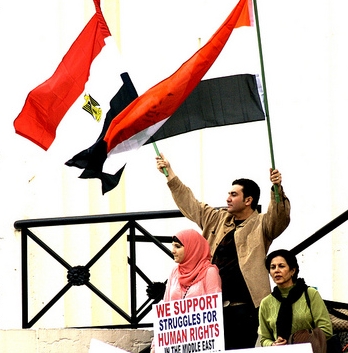A Hazy Legacy of Human Rights Abuse: Podcast with Moataz El Fegiery
In this podcast, ICTJ speaks with Moataz El Fegiery, deputy director of the MENA program, to understand the goals of the conference and the challenges facing Egypt's transition. Fegiery hopes the conference can both address the human rights violations that occurred during and before the revolution and provide an opportunity to discuss different transitional justice measures that can be used to strengthen Egypt’s transition.
Fegiery also analyzes the effectiveness of specific transitional justice measures already taking place in Egypt, such as criminal justice initiatives.
“Trials themselves need to take time, and there needs to be a deep and significant investigation prior,” he posits. “In order to maximize the impact of these trials, investigation needs to be fair, institutions need to be independent, and civil society groups, such as human rights organizations, need to be included."

The inclusion of women in the political sphere is also a focus of the transition. Unlike their Tunisian counterparts, women in Egypt, who played an integral role in the actual revolution, have largely been excluded from transitional justice initiatives in the country. Fegiery offers recommendations on how to incorporate a gender-sensitive approach in the transitional justice process.
Traditional mechanisms such as criminal prosecutions and truth-seeking initiatives can also be employed to prevent the recurrence of economic crimes perpetrated under the Mubarak regime. As a root cause of the revolution, Fegiery insists that addressing these crimes is essential to guaranteeing they don’t recur.
“There was an atmosphere of impunity under the Mubarak regime regarding economic crimes. There needs to be a drastic investigation and transparent prosecution of all economic crimes, not only a selected few.”
When asked about particular recommendations for Egypt’s transitional society, Fegiery emphasizes the country-specific challenges that arise given Egypt's social, political, and cultural history.
“We hope that there will be a new elected government in the country which will be able to listen to the aspirations of the people and develop modalities that are suitable to the local conditions in the country.”
Listen to the podcast
Download | Duration:20 mins | File size: 19MB
Photos: A demonstration for Libyan human rights, tolkien1914's photostream
